Preparing for bariatric surgery can feel overwhelming, but having a clear checklist can make the journey smoother and more manageable. This essential guide highlights the key steps you need to take, from pre-operative evaluations to lifestyle adjustments. By understanding what to expect and how to prepare, you can set yourself up for success and a healthier future. So, let's dive into the details of your bariatric surgery preparation checklist!
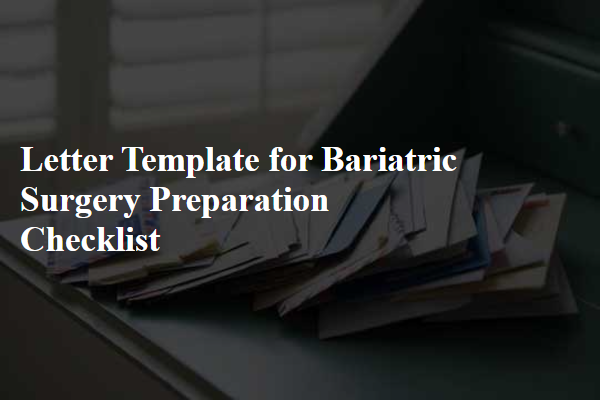
Personal Medical History Evaluation
A thorough personal medical history evaluation is crucial for individuals considering bariatric surgery, which is a surgical procedure aimed at assisting significant weight loss and addressing obesity-related health issues. Potential candidates must disclose past medical conditions, such as type 2 diabetes, hypertension, or sleep apnea, as these diseases can influence surgical risks and recovery time. Current medications, including over-the-counter drugs and supplements, should be listed, as they may interact with anesthetic agents and affect healing. Family health history, specifically noting any hereditary conditions like cardiovascular diseases or metabolic disorders, provides healthcare professionals with insight into potential complications. An accurate assessment of prior surgical procedures, including any gastrointestinal surgeries, is essential for determining eligibility and procedural approach. Comprehensive knowledge of lifestyle habits, such as diet patterns, physical activity levels, and smoking history, assists in tailoring a post-operative care plan that promotes weight loss and enhances overall health.
Dietary and Lifestyle Assessment
Bariatric surgery preparation requires comprehensive dietary and lifestyle assessments to ensure optimal outcomes. Prior to the procedure, individuals undergo evaluations focusing on body mass index (BMI), typically over 40 or over 35 with comorbidities, to determine surgical eligibility. Nutritionists often recommend a high-protein, low-carbohydrate diet, mainly incorporating lean proteins, vegetables, and whole grains, typically consuming around 800-1200 calories per day in the pre-operative phase. Lifestyle changes, such as engaging in regular physical activity (aim for at least 150 minutes weekly), significantly enhance surgery success rates. Psychological evaluations assess readiness for the significant lifestyle changes following surgery, addressing issues related to emotional eating or food addiction. These assessments may take place at healthcare facilities specializing in bariatric programs, often located in major cities like Houston or Los Angeles, ensuring comprehensive support throughout the pre-operative journey.
Pre-Operative Tests and Screenings
Bariatric surgery preparation involves essential pre-operative tests and screenings crucial for safety and efficacy. Medical evaluations such as comprehensive blood tests can identify nutritional deficiencies, blood sugar levels, and overall health status necessary before the procedure. An electrocardiogram (ECG) assesses heart function and detects any existing cardiac issues, crucial for minimizing surgical risks. A psychological assessment ensures candidates are mentally prepared for lifestyle changes post-surgery, which can significantly impact long-term success rates. Imaging studies like upper gastrointestinal (GI) series or abdominal ultrasound help visualize anatomical structures, which aids in surgical planning. Additionally, consultations with nutritionists provide tailored diet plans designed for optimal health pre- and post-surgery. Compliance with these evaluations at specialized centers enhances preparedness, ensures safety, and maximizes the chances of achieving desired weight loss goals.
Psychological Readiness and Support
Psychological readiness is crucial for patients considering bariatric surgery. Comprehensive evaluations must include assessments from licensed mental health professionals who specialize in obesity-related issues. Tools such as the Beck Depression Inventory or the Eating Disorder Examination Questionnaire might be utilized to gauge emotional stability and readiness for lifestyle changes. Additionally, support systems comprising family, friends, or support groups can enhance motivation and accountability. Regular check-ins with a psychologist can help patients navigate triggers and develop coping strategies. Post-operative counseling and support groups, such as those provided by the American Society for Metabolic and Bariatric Surgery, facilitate ongoing emotional adjustment and reinforcement of healthy habits.
Post-Operative Recovery Plan
Creating a comprehensive post-operative recovery plan is essential for patients undergoing bariatric surgery, typically performed at specialized centers like the Cleveland Clinic or the Mayo Clinic. Patients should prepare for a recovery period that generally spans several weeks. Key tasks include arranging for a support system, ideally involving family or friends to assist with daily activities and emotional support during the initial healing phase. Medication management is also crucial; patients must be aware of prescribed pain medications and any necessary vitamins, such as Vitamin B12 and iron, to aid nutritional recovery. Diet modifications should begin prior to surgery, with a focus on a liquid diet transitioning to pureed foods, then soft foods over the course of several weeks, tailored per physician guidelines. Additionally, incorporating gentle physical activity, such as a daily 10-minute walk, will enhance circulation and promote recovery while minimizing complications like blood clots. Important reminders include follow-up appointments at the surgical center, typically scheduled within one to three weeks post-surgery, to monitor healing and weight loss progress. Understanding potential complications, such as infection or nutritional deficiencies, must be forefront, ensuring patients recognize symptoms that require immediate medical attention. Overall, effective preparation and adherence to the post-operative recovery plan are critical for successful outcomes in bariatric surgery patients.
Letter Template For Bariatric Surgery Preparation Checklist Samples
Letter template of Bariatric Surgery Psychological Evaluation Requirements
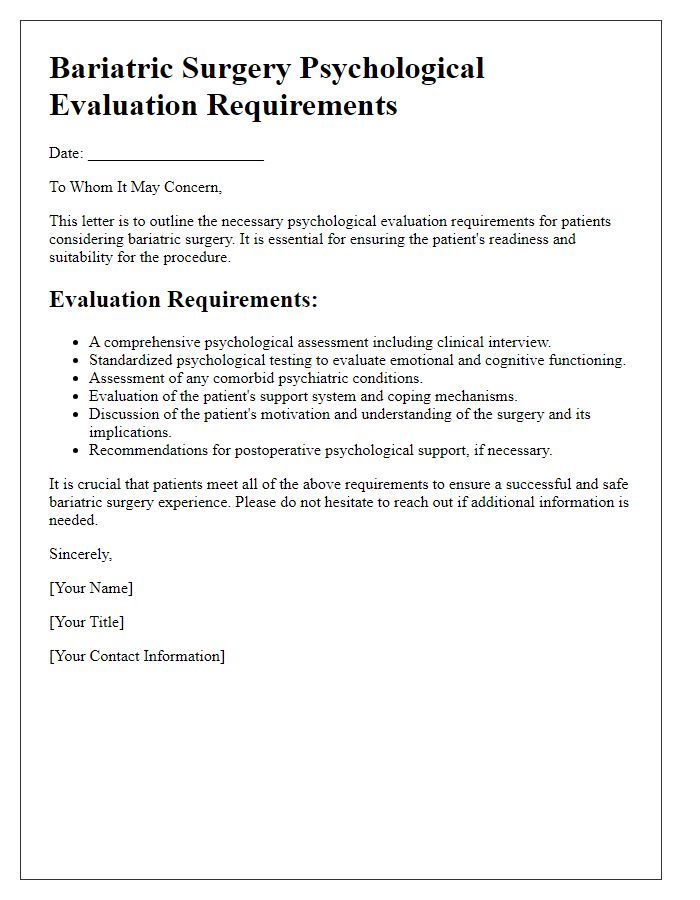
Letter template of Bariatric Surgery Nutritional Supplements Information
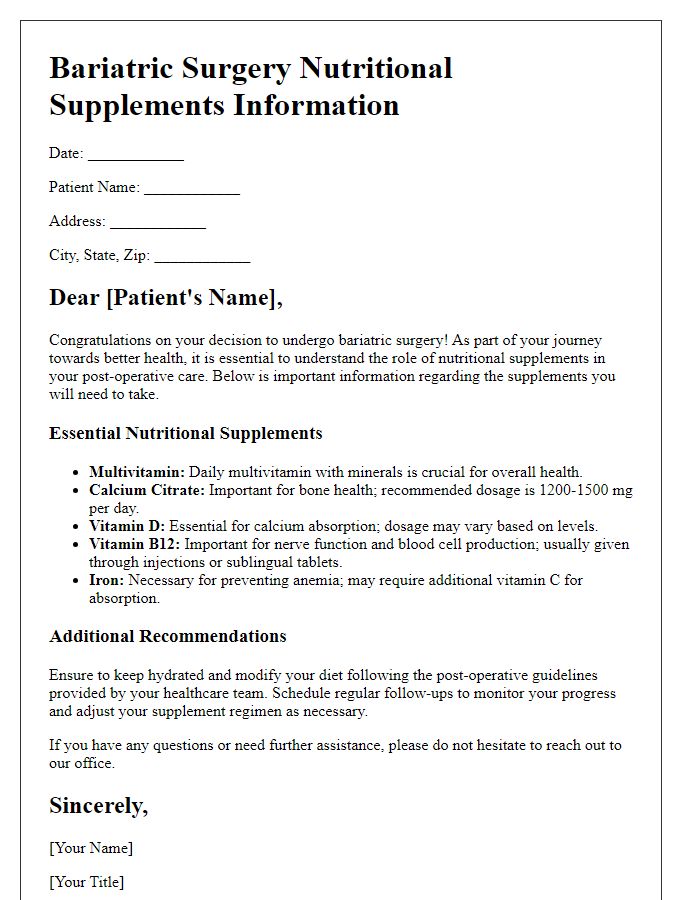

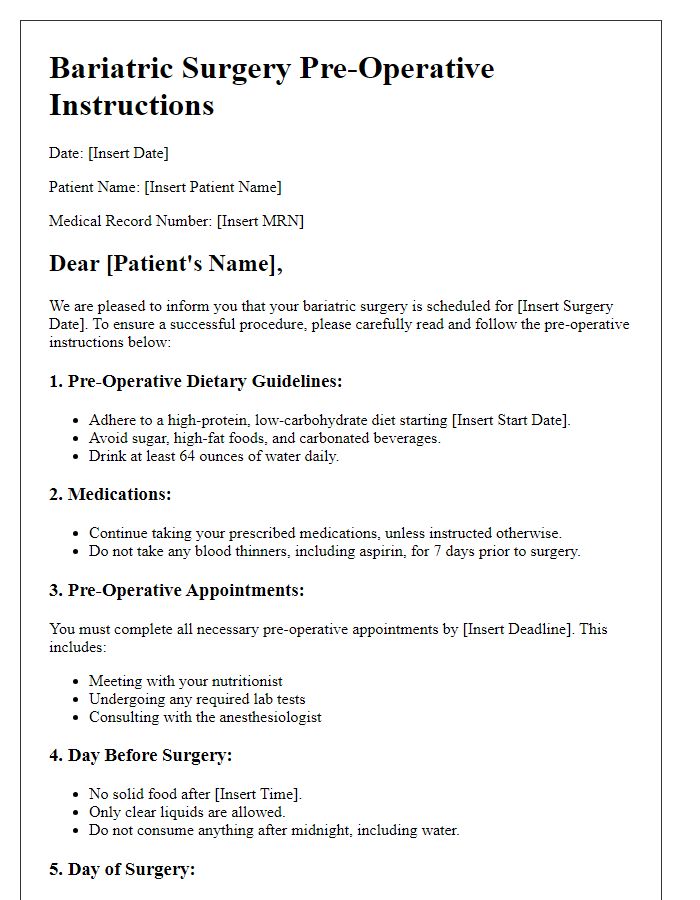
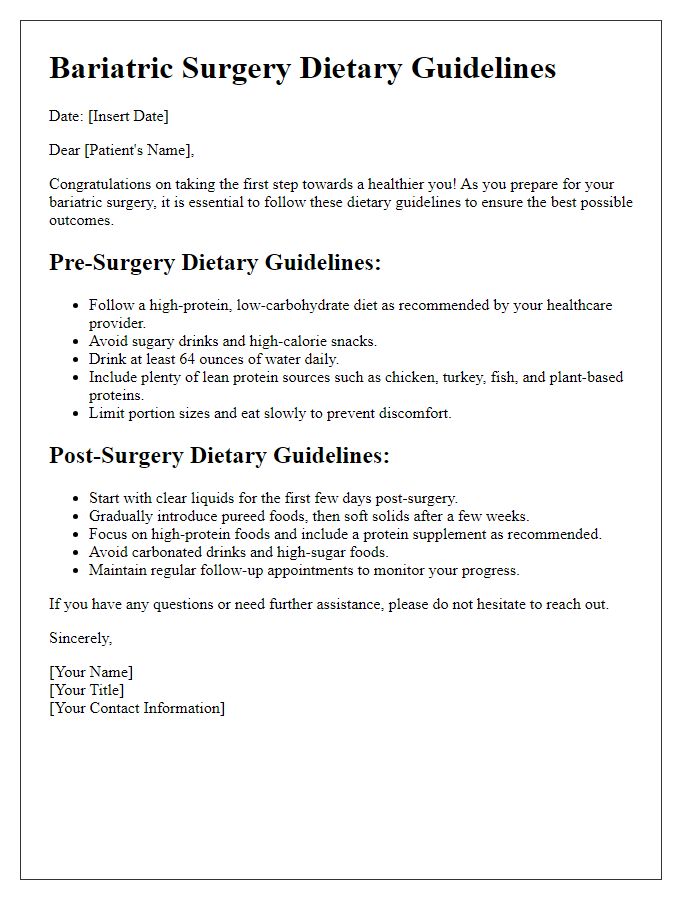
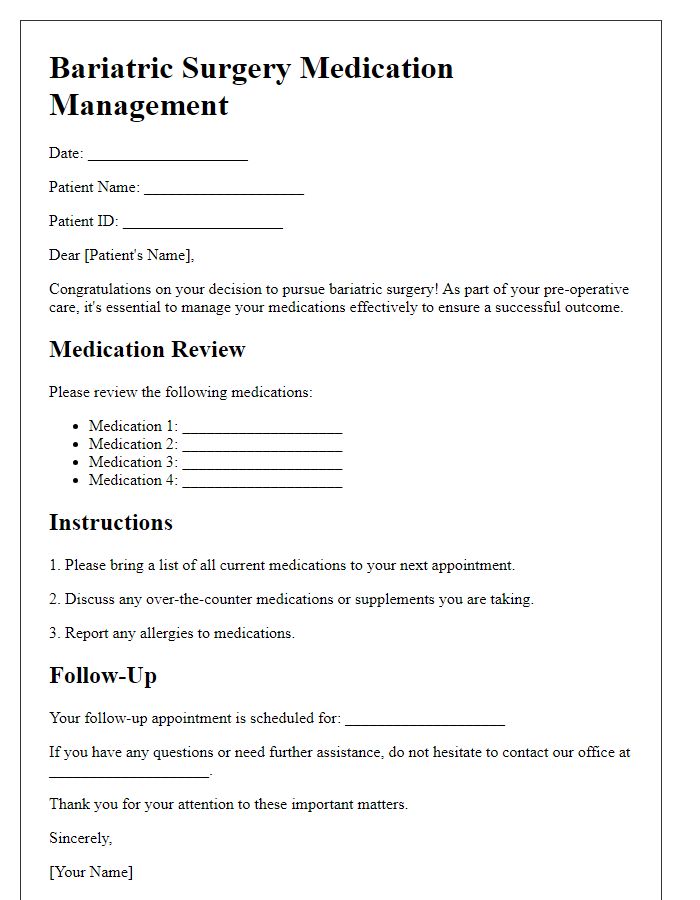
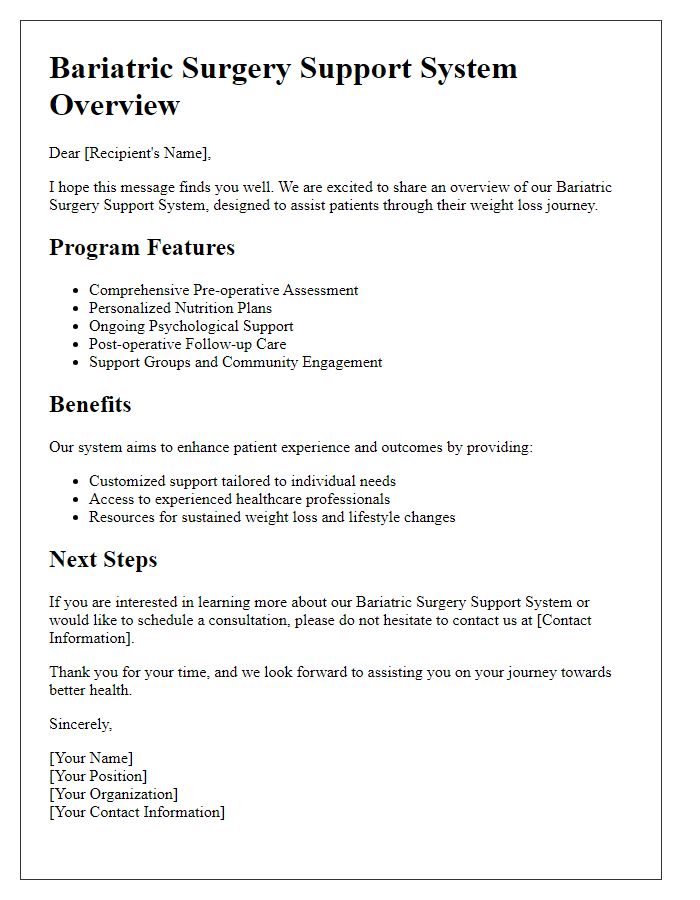
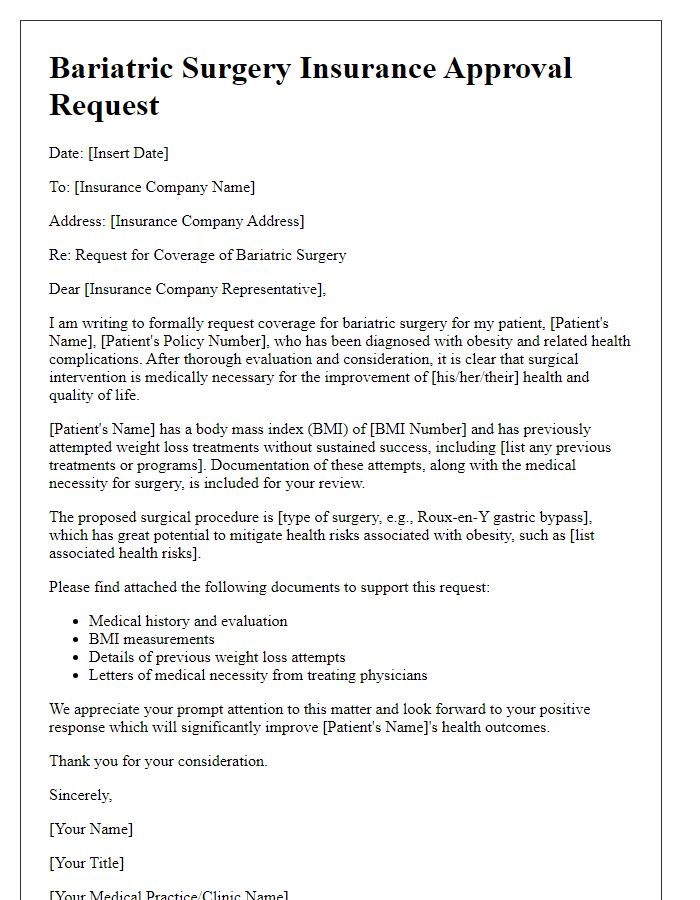
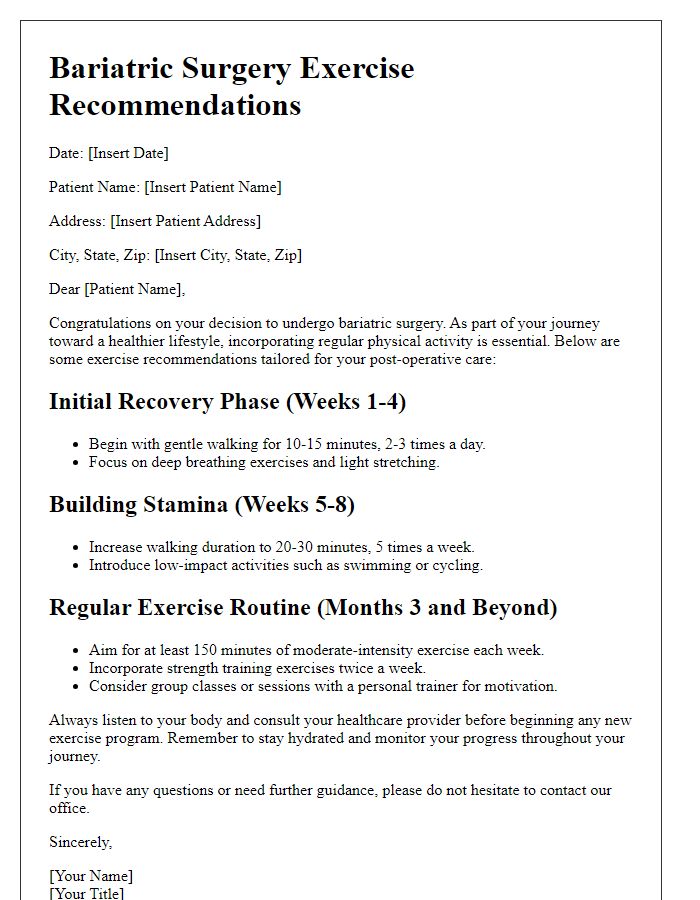
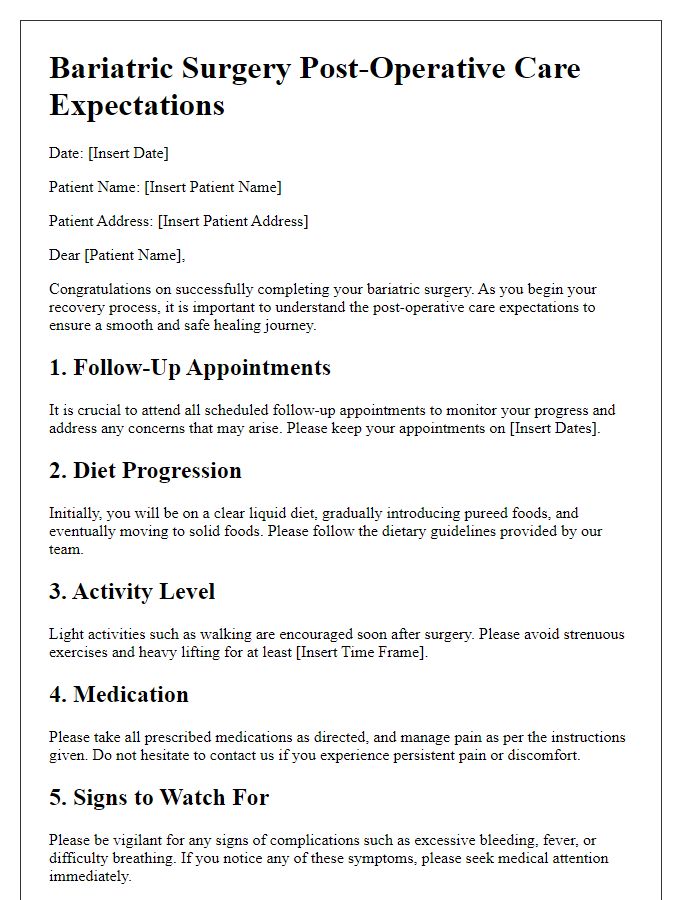
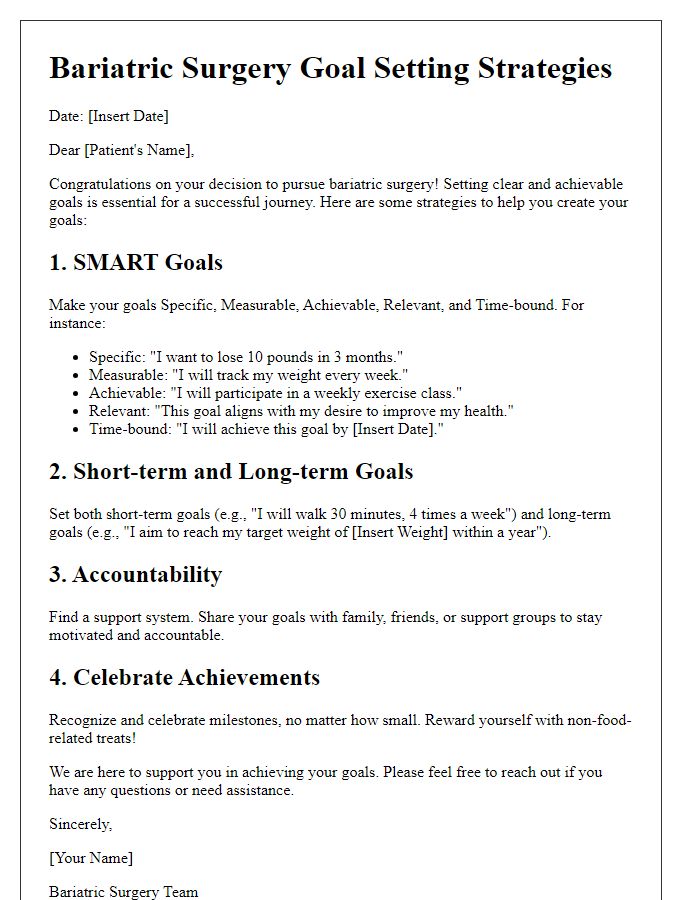


Comments